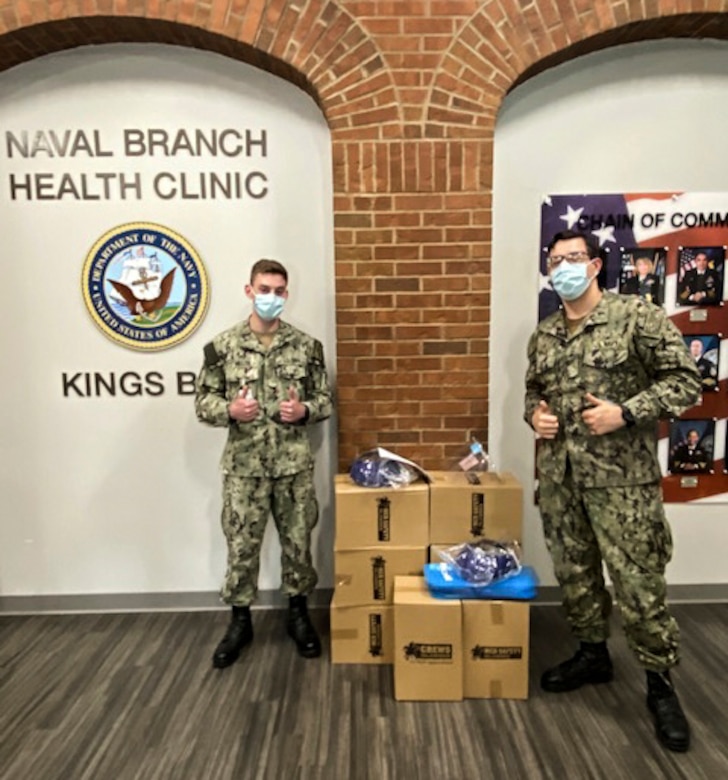May 18, 2020 | BY Bryan Gatchell
To combat the spread of the COVID-19 pandemic in Belgium,
the U.S. Army Benelux Garrison and its
mission partners converted the chapel at Caserne Daumerie in Chièvres, Belgium,
into a medical holding facility in less than 30 days.
The garrison's intent was to repurpose an unused space for
service members suffering from
respiratory distress. The patients would stay at the holding facility
until Landstuhl Regional Medical Center in Germany was ready to receive them
and travel arrangements were in place.
Caserne Daumerie is across the Grand Rue in Chièvres from
Chièvres Air Base, the garrison's current headquarters. It has largely been
inactive since most of its activities moved to the air base, making it an ideal
location for standing up temporary COVID-19 response facilities. In addition to
the medical holding facility, there are also quarantine and isolation
facilities for service members arriving from COVID-19 hotspots.
Army Lt. Col. Anthony Rhea, the deputy commander for nursing
care at SHAPE Healthcare Facility, described the impetus for setting up the
facility.
"What can we do if this pandemic reaches a point where
the Belgian health care system gets overwhelmed, and they cannot take care of
our U.S./SHAPE/NATO community?" Rhea asked. "The Belgian government
and the Belgian health care system did a good job of managing COVID-19 in their
country to where we didn't reach the point where we thought we had to use this facility."
"It's a contingency plan," said Dwayne Key, the
plans officer for USAG Benelux. "It's a plan for something that you hope
you'll never have to use."
Key, along with other garrison organizations and mission
partners, originally worked on the medical holding facility with the intent to
establish a field hospital or combat support hospital. It was determined,
however, that construction of a temporary hospital would require greater
resources from U.S. Army Europe, possibly straining a medical system already
combating COVID-19 throughout the theater.
Instead, the facility was designed as a waystation for the
ill, able to accommodate as many as 10 personnel suffering intermediate to
intense respiratory distress for a few hours.
"The great thing about this building is it's just a
shell," Rhea said. "So let's say that for whatever reason [Regional
Health Command Europe] can send a portion of a field hospital here to provide
longer care in the facility. They can still do that."
Key said he was amazed at how rapidly everyone worked
together to establish the hospital..
"From the day that we received our mission and the
commander's intent, … it reached that initial stage of readiness in just under
30 days," he said.
Among the improvements to the building, plexiglass walls
were erected to prevent the spread of the virus from bed to bed. Plastic
sheeting was put up on all the remaining walls in the building. New flooring
was put down. Electric capacity was increased to accommodate the medical
equipment. An airflow unit was installed to filter the air and pressurize the
interior to help decrease the risk of aggravating the patients' condition. A
ramp that allows easier transport of patients on gurneys. A staff entrance and
exit allows personnel to change their personal protective equipment and
disinfect before entering and exiting the facility.
These improvements took the Directorate of Public Works
personnel three weeks to complete. Scott Chapman, the chief of business
operations and integration for DPW, said the renovation was "a perfect
example of how great teamwork makes wonderful things happen."
"DPW maintenance workers, supply technicians and
engineers worked tirelessly together with SHAPE Healthcare employees to
condense a six-week project into three," Chapman said.
Key said the modifications made to the building were not the
end of the planning process. Plans included ways to support the lifesaving
staff and the families of the affected service members.
"While the hospital or treatment facility was being
built, the planning team was also putting together and standing up our
abilities to execute those efforts as well," Key said. "So it wasn't
just a singular focus. It was a broad look at what was the one thing that we
would absolutely have to do, and then the other things that were essential to
success after the first patient arrives."
In the Netherlands and in Belgium, the trend of daily new
hospitalizations has steadily decreased since early April. Key said that given
their team's ability to establish the facility so efficiently, expanding the
capacity at Caserne Daumerie would be possible if the need arises.
Rhea said that judging by Belgium's capacity to manage the
virus, he does not believe expansion would be necessary. Even if the number of
hospitalizations were to swell in a second wave of infections, 10 beds are
enough for the USAG Benelux community, he added.
"That should be sufficient for holding
capability," he said. "For the size of the population that we
support, for this particular virus, that should be sufficient."
(Bryan Gatchell is assigned to U.S. Army Garrison Benelux.)










